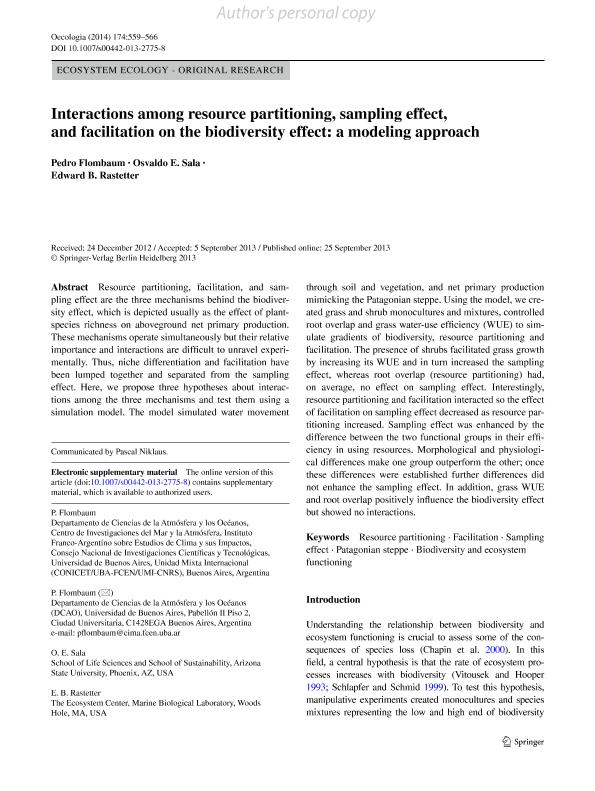Mostrar el registro sencillo del ítem
dc.contributor.author
Flombaum, Pedro

dc.contributor.author
Sala, Osvaldo Esteban
dc.contributor.author
Rastetter, Edward B.
dc.date.available
2016-02-26T20:30:40Z
dc.date.issued
2014-01
dc.identifier.citation
Flombaum, Pedro; Sala, Osvaldo Esteban; Rastetter, Edward B.; Interactions among resource partitioning, sampling effect, and facilitation on the biodiversity effect: A modeling approach; Springer; Oecologia; 174; 2; 1-2014; 559-566
dc.identifier.issn
0029-8549
dc.identifier.uri
http://hdl.handle.net/11336/4476
dc.description.abstract
Resource partitioning, facilitation, and sampling effect are the three mechanisms behind the biodiversity effect, which is depicted usually as the effect of plant-species richness on aboveground net primary production. These mechanisms operate simultaneously but their relative importance and interactions are difficult to unravel experimentally. Thus, niche differentiation and facilitation have been lumped together and separated from the sampling effect. Here, we propose three hypotheses about interactions among the three mechanisms and test them using a simulation model. The model simulated water movement through soil and vegetation, and net primary production mimicking the Patagonian steppe. Using the model, we created grass and shrub monocultures and mixtures, controlled root overlap and grass water-use efficiency (WUE) to simulate gradients of biodiversity, resource partitioning and facilitation. The presence of shrubs facilitated grass growth by increasing its WUE and in turn increased the sampling effect whereas root overlap (resource partitioning) had, on average, no effect on sampling effect. Interestingly, resource partitioning and facilitation interacted so the effect of facilitation on sampling effect decreased as resource partitioning increased. Sampling effect was enhanced by the difference between the two functional groups in their efficiency in using resources. Morphological and physiological differences make one group outperform the other, once those differences were established further differences did not enhance the sampling effect. In addition, grass WUE and root overlap positively influence the biodiversity effect but showed no interactions.
dc.format
application/pdf
dc.language.iso
eng
dc.publisher
Springer

dc.rights
info:eu-repo/semantics/openAccess
dc.rights.uri
https://creativecommons.org/licenses/by-nc-sa/2.5/ar/
dc.subject
Efecto de Muestreo
dc.subject
Biodiversidad
dc.subject
Facilitación
dc.subject
Partición de Recursos
dc.subject.classification
Ecología

dc.subject.classification
Ciencias Biológicas

dc.subject.classification
CIENCIAS NATURALES Y EXACTAS

dc.title
Interactions among resource partitioning, sampling effect, and facilitation on the biodiversity effect: A modeling approach
dc.type
info:eu-repo/semantics/article
dc.type
info:ar-repo/semantics/artículo
dc.type
info:eu-repo/semantics/publishedVersion
dc.date.updated
2016-03-30 10:35:44.97925-03
dc.journal.volume
174
dc.journal.number
2
dc.journal.pagination
559-566
dc.journal.pais
Alemania

dc.journal.ciudad
Berlin
dc.description.fil
Fil: Flombaum, Pedro. Consejo Nacional de Investigaciones Científicas y Técnicas. Oficina de Coordinacion Administrativa Ciudad Universitaria. Centro de Investigaciones del Mar y la Atmósfera; Argentina. Universidad de Buenos Aires. Facultad de Ciencias Exactas y Naturales. Departamento de Ciencias de la Atmósfera y los Océanos; Argentina
dc.description.fil
Fil: Sala, Osvaldo Esteban. Arizona State University. School of Life Sciences and School of Sustainability; Estados Unidos
dc.description.fil
Fil: Rastetter, Edward B.. Marine Biological Laboratory. The Ecosystem Center; Estados Unidos
dc.journal.title
Oecologia

dc.relation.alternativeid
info:eu-repo/semantics/altIdentifier/url/http://link.springer.com/article/10.1007%2Fs00442-013-2775-8
dc.relation.alternativeid
info:eu-repo/semantics/altIdentifier/doi/http://dx.doi.org/10.1007/s00442-013-2775-8
dc.relation.alternativeid
info:eu-repo/semantics/altIdentifier/issn/0029-8549
Archivos asociados
